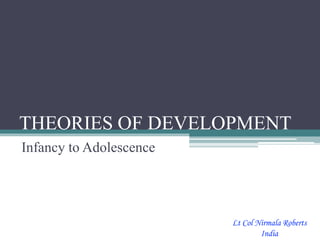
2. Theories of Growth & Development .pptx
- 1. THEORIES OF DEVELOPMENT Infancy to Adolescence Lt Col Nirmala Roberts India
- 2. Childhood is crucial! Research has shown that – � Early childhood is the most important stage of brain devt. � Infant’s brain – About 1/4 of adult brain. At 1 yr - 50%; at 3 yrs - 80%; and by 5 yrs of age - 90% of adult brain! �Infant’s brains develop in response to stimulation (sight, sound, touch, touch, smell…) �Infant’s who are stimulated develop more quickly and have more secure self image
- 3. Child Development Theories.. � Help explain and predict human behaviour � Explain how children change and grow over the course of childhood. � Focuses on emotional, social and cognitive development
- 4. Theories of Development 1. Psychosocial theory – Eric Erikson 2. Psychosexual theory – Sigmund Freud 3. Cognitive theory – Jean Piaget 4. Spiritual theory – James Fowler 5. Moral theory – Lawrence Kohlberg
- 6. Psychosocial theory… � 8 stages of development � Each stage has unique developmental tasks � Achievement of devt. al tasks in a stage prepares child to move to next stage �Failure to achieve a devt.al task Regression
- 7. Psychosocial theory… � Infancy (0 – 1 yr) - Trust Vs Mistrust (Hope/ expectation) � Toddler hood (1-3 yrs)- Autonomy Vs shame & doubt (Will/ Strength of character) � Pre Schooler (3-6 yrs) – Initiative Vs guilt (Purpose/ Rationale) � Schooler (6-12 yrs) – Industry Vs inferiority (Competence/ Ability) ★ Adolescent (12-18 yrs) – Identity vs role confusion (Fidelity/ Loyalty)
- 8. �Young adult (20 - 40 years) - Intimacy vs. Isolation (Love/ commitment) � Middle age (40 - 64 years) - Generativity vs. Stagnation (Care/ contribution) � Old age (65 - death) - Ego Integrity vs. Despair (Wisdom/ fulfillment)
- 10. Psychosexual theory… � Personalities depend upon how the physical needs are met in childhood � At the different stages in childhood, particular areas of body gives pleasure to child. � If the needs are not fulfilled, they fail to successfully pass through the stages (= fixation)
- 11. Psychosexual theory… � Personality has 3 ego states – � Id (pleasure), Ego (reality), Superego (moral) � 5 Stages of psychosexual development � Oedipus complex allows child to identify with same sex parent � Fixation is an unresolved conflict during a stage of development Superego Id Ego C A P
- 12. Psychosexual theory… Age Stage Pleasure focus Ego state Infancy (0 – 1 yr) Oral stage Mouth Id Toddler hood (1-3 yrs) Anal stage Anus Preschooler (3-6 yrs) Phallic stage Genitalia Superego Schooler (6-12 yrs) Latency stage Repression of sexual interests Devt of social & intellectual skills Adolescent (12-18 yrs) Genital stage Sexual reawakening. Source of pleasure – someone outside of the family
- 14. Cognitive theory… � Stress on conscious mental processes � Cognitive processes are influenced by biological maturation � Children learn through developing ‘schemas’ (building blocks of knowledge) � 4 stages of cognitive development
- 15. Cognitive theory… �Children understand the world through – �Assimilation – Uses existing schema to deal with a new object/ situation �Accommodation – Changing schema to deal with a new object/ situation, when the existing schema does not work �Equilibrium - The force which moves development along � Hence children need hands-on experience to construct their understanding
- 16. 1. Sensorimotor stage (0-2 yrs) Schema Assimilation ……. Accommodation Key feature – Object permanence • Coordinates sensory experiences with physical actions • Reflexive…instinctual….symbolic thought
- 17. 2. Pre operational stage (2 – 7 yrs) �Emerging ability to think. Uses words & images to represents things. Intuitive stage from 4 yrs. Can classify by one trait. Cannot break down a whole into parts. �Key feature – Egocentrism, symbolism
- 18. 3. Concrete operations (7-11 yrs) �Reasoning about concrete events (‘here and now’) �Cana think systematically, but with actual objects �Beginning of internalization of tasks �Simple classification. �Key feature – Conservation (Can reverse operations)
- 19. 4. Formal operations (11+ yrs) �Reasoning in abstract, idealistic and logical ways �Key feature – Abstract reasoning, reasoning, problem solving
- 21. Spiritual theory… �Faith = A holistic orientation, and is concerned with the individual’s relatedness to the universe
- 22. Spiritual theory… �Stage 0 – “Primal or Undifferentiated” faith (0 - 2 yrs)- Early learning of the safety of their environment (= warm, safe and secure vs. hurt, neglect and abuse). Consistent Vs inconsistent nurturance Divinity vs non divinity about universe �Stage 1- “Intuitive-Projective” faith (3-7 yrs), - Characterized by the psyche’s unprotected exposure to the Unconscious. Intuitive images of good and evil. Fantasy and reality are the same.
- 23. �Stage 2 “Mythic-Literal” faith (school age) - Strong belief in the justice and reciprocity of the universe; deities are seen as anthropomorphic. Literal interpretation of religious stories. God is like a parent figure. �Stage 3 “Synthetic-Conventional” faith (adolescence) Characterized by conformity. More abstract thoughts.
- 25. Moral development – Kohlberg �Level 1 (Pre-Conventional) �1. Obedience and punishment orientation (How to avoid punishment?) �2. Self-interest orientation (What's in it for me?...Paying for a benefit) �Level 2 (Conventional) �3. Interpersonal accord and conformity (Social norms - Good boy/girl) �4. Authority and social-order maintaining (Law and order morality) �Level 3 (Post-Conventional) �5. Social contract orientation. Universal ethical principles (Principled conscience)
